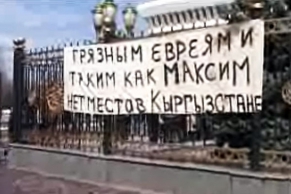|
World Jewish News

Antisemitic poster in Bishkek. Photo by IzRus.co.il
|
Kyrgyz Jews hold breath amid upheaval
09.04.2010, Anti-Semitism As the capital of Kyrgyzstan erupted in violence Wednesday, members of the Central Asian nation’s small Jewish community held their breath and sat tight.
The ORT school in the capital, Bishkek, shuttered its doors, sending students home just as they were returning from their Passover break. With public transportation suspended and the city in disarray, only three people made it to morning services at the local synagogue. Meanwhile, Jewish community leaders exchanged frantic phone calls, updating each other about the situation on the street.
By the end of the day Wednesday, opposition protestors had stormed the presidential compound, overwhelmed the police and taken control of the government. The president, Kurmanbek Bakiev, had fled, and more than 40 people had been killed. On Thursday, a former foreign minister announced he was leading a new, transitional government, which would last six months.
It was not immediately clear where this one-day revolution would leave the country -- or its estimated 1,500 Jews, most of whom live in Bishkek.
“The situation is the city remains unstable, but the Jewish community has not suffered so far,” Kyrgyzstan’s chief rabbi, Arieh Reichman, told JTA. “All the community leaders keep in touch with each other and with the community members, mostly by phone. I have been contacted by an Israeli foundation that could provide us with humanitarian aid. But the situation is not as bad so far, and hopefully things will calm down in the near future.”
More than half of Bishkek’s Jews are on community welfare, receiving aid through the local Hesed center, which is sponsored by the American Jewish Joint Distribution Committee. Asher Ostrin, the executive director of JDC’s operations in the former Soviet Union, said the community was working to ensure that its Jewish welfare clients experience no disruption during the unrest.
“When the rioting spread earlier in the week, and then escalated into a full scale revolution, we established immediate and ongoing contact with our sources in the community,” Ostrin said in a dispatch to JDC officials. “There were no reported injuries among the Jewish population. Critically, we were told that services to elderly clients were not interrupted.”
A security office at the synagogue, Valentin Sharov, said the violence came close but did not reach the shul.
“A shop just 100 meters from us was ravaged last night, but no one tried to attack the synagogue,” Sharov said on Thursday.
After shuttering early on Wednesday, all the city’s Jewish institutions stayed closed on Thursday, reported Vladimir Katsman, director of Bishkek’s ORT school.
“Yesterday we had to finish the lessons earlier than usual and to close the school until the situation gets more foreseeable. We even called the parents to come and take the children, because we were not sure the school bus that usually takes the children home could be safe enough,” Katsman said. “Our ORT school is under surveillance. It became more difficult and expensive to keep the security men on duty these days, but we managed to solve the problem.”
The Jews of Kyrgyzstan are comprised largely of the second- and third-generation descendants of Jews from Ukraine, Belarus and central Russia who fled here to escape the Nazis during World War II. Most returned home after the war, but enough remained to make an impression in Kyrgyzstan, where many of the Jews went into health care. Even during the era of Soviet state-sponsored anti-Semitism, there was little hostility toward Jews in this remote republic, local Jews said. When the country became independent after the collapse of the Soviet Union, Jewish security remained good. Though three-quarters of Kyrgyzstan’s 5.5 million people are Muslim, radical Islam has not really gained a foothold in the country.
“We don’t feel any problems because of the Islamic environment,” Katsman said. “I haven’t heard of any anti-Semitic utterances because of the street violence so far.”
However, one journalist in the country told JTA about an encounter with a group of drunken young people demanding to know if the journalist was Jewish. The leader of the group made a disparaging remark about Jews.
The closest Israeli embassy, in neighboring Kazakhstan, said it was tracking events closely.
“We ask citizens of Israel who are in Kyrgyzstan to get in touch with us. This is a standard procedure in case of any trouble,” an embassy official told JTA. “We do not have plans for an evacuation operation so far. We don’t have information on the exact number of Israelis in Kyrgyzstan.”
The ousted government, while widely considered repressive, was also pro-Western, and the United States has a large air base in Kyrgyzstan that’s critical to the NATO campaign in nearby Afghanistan. It’s not clear whether or not the U.S. friendliness toward the former regime -- which the opposition denounced and which U.S. observers described as a stance borne of pragmatism -- will cost the West in its relationship with the new Kyrgyz government, which has close ties to Moscow. Opposition members who took control Wednesday said they were interested in creating a government based on “justice and democracy.”
Kyrgyzstan is bordered by three other former Soviet Republics -- Tajikistan, Uzbekistan and Kazakhstan – as well as China.
“Jews were treated good in Bishkek even in Soviet times, and we hope that whatever government is in power in Kyrgyzstan, this will remain the same and Jews will prosper here,” Reichman said.
By Anna Rudnitskaya & Uriel Heilman
JTA
|
|
